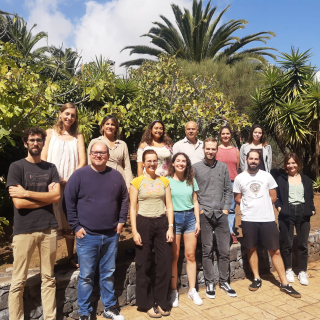Bibcode
DOI
Martínez-Delgado, David; Peñarrubia, Jorge; Gabany, R. Jay; Trujillo, I.; Majewski, Steven R.; Pohlen, M.
Referencia bibliográfica
The Astrophysical Journal, Volume 689, Issue 1, pp. 184-193.
Fecha de publicación:
12
2008
Revista
Número de citas
145
Número de citas referidas
115
Descripción
We present an extragalactic perspective of an extended stellar tidal
stream wrapping around the edge-on spiral galaxy NGC 5907. Our deep
images reveal for the first time a large-scale complex of arcing loops
that is an excellent example of how low-mass satellite accretion can
produce an interwoven, rosette-like structure of debris dispersed in the
halo of its host galaxy. The existence of this structure, which has
probably formed and survived for several gigayears, confirms that halos
of spiral galaxies in the local universe may still contain a significant
number of galactic fossils from their hierarchical formation. To examine
the validity of the external accretion scenario, we present N-body
simulations of the tidal disruption of a dwarf galaxy-like system in a
disk galaxy plus dark halo potential that demonstrate that most of the
tidal features observed in NGC 5907 can be explained by a single
accretion event. Unfortunately, with no kinematic data and only the
projected geometry of the stream as a constraint, the parameters of our
model are considerably degenerate and, for now, must be considered
illustrative only. Interestingly, NGC 5907 has long been considered a
prototypical example of a warped spiral in relative isolation. The
presence of an extended tidal stream challenges this picture and
suggests that the gravitational perturbations induced by the stream
progenitor must be considered as a possible cause for the warp. The
detection of an old, complex tidal stream in a nearby galaxy with rather
modest instrumentation points to the viability of surveys to find
extragalactic tidal substructures around spiral galaxies in the Local
Volume (<15 Mpc), with the prospect of obtaining a census with enough
statistical significance to be compared with cosmological simulations.
Proyectos relacionados

Huellas de la Formación de las Galaxias: Poblaciones estelares, Dinámica y Morfología
Bienvenida a la página web del g rupo de investigación Traces of Galaxy Formation. Somos un grupo de investigación amplio, diverso y muy activo cuyo objetivo principal es entender la formación de galaxias en el Universo de una manera lo más completa posible. Con el estudio detellado de las poblaciones estelares como bandera, estamos constantemente
Ignacio
Martín Navarro